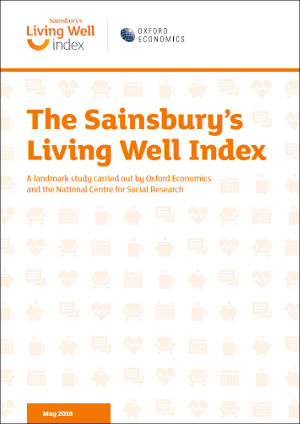Ungated Post | 22 May 2018
The Sainsbury’s Living Well Index 2018

The Living Well Index fell by 0.5 points to 60.7 compared to launch, with much of this drop apparently linked to seasonal factors.
The Living Well Index (LWI) was launched last year by Sainsbury’s in partnership with Oxford Economics and the National Centre for Social Research. It provides a unique insight into the mood of the nation, helping us to track how the nation’s wellbeing is shifting over time and identify factors that can explain these trends. The latest edition of the LWI, based on survey data collected during January – February 2018, fell by 0.5 points to 60.7, consistent with a slight drop in reported wellbeing. Much of this decline appears to have been driven by seasonal factors. The chillier weather prompted adults to spend leisure time outdoors and to socialise more often. Meanwhile, satisfaction with public transport amid an increase in delays and cancellations.
Oxford Economics’ team is expert at applying advanced economic tools that provide valuable insights into today’s most pressing business, financial, and policy issues.
To find out more about our capabilities, contact:
Americas
Diantha Redd
+1 (646) 503 3052
Email
Asia Pacific
Peter Suomi
+65 6850 0110
Email
EMEA
Aoife Pearson
+44 (0)203 910 8054
Email
Related Services

Post
The economic impact of abandoning the WTO
Oxford Economics have been commissioned by the International Chamber of Commerce (ICC) to provide an independent assessment of the economic impact of WTO dissolution. This report details our findings and the assumptions underpinning our analysis.
Find Out More
Post
The economic impact of the sports activities of public service media
This study shows how the sports activities of public service media supported €4.5 billion of GDP and 57,000 jobs across 31 European countries in 2022. The report also highlights wider economic benefits of public service media sports coverage, such as the way in which it leverages sponsorship income for sports bodies.
Find Out More
Post
Global Trade Education: The role of private philanthropy
Global trade can amplify economic development and poverty alleviation. Capable leaders are required to put in place enabling conditions for trade, but currently these skills are underprovided in developing countries. For philanthropists, investing in trade leadership talent through graduate-level scholarships is an opportunity to make meaningful contributions that can multiply and sustain global economic development.
Find Out More